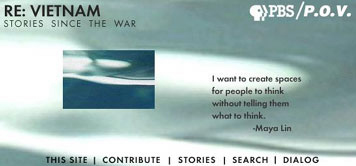talking history | syllabi | students | teachers | puzzle | about us
RE: Vietnam—Stories since the War
http://www.pbs.org/pv/stories/
Developed by P.O.V. Interactive, in cooperation with PBS Online, under the direction
of Marc N. Weiss.
Visited Dec. 20, 2001- Jan. 15, 2002.

RE: Vietnam is an interactive collecting, archival, and dialogue site focused on stories about the Vietnam War and its troubled, living legacy in history and individual lives over time. The site, developed by P.O.V. Interactive/PBS Online, was active from 1996 through 1998, soliciting, receiving, and posting thematically organized selections of individual stories, testimonies, oral histories, remembrances, and documents. It also supported threaded discussion groups, and it offered an extensively searchable database of collected materials. It ceased actively accepting contributions in March 1998, referring visitors to the Vietnam Veterans Memorial Fund, which has been carrying on work that is in many ways similar.
The Web is littered with inactive sites that can be annoying for those encountering them unawares—many buttons do not work (here, the posted stories are available, but not the searchable archive), and many hot links are stone cold. But sites all of three to five years old, such as this one, offer a sense of how rapidly online substance, presentation, and interactivity have evolved. And they may offer—in approach, organization, and especially in posted material particularly useful for research—resources otherwise unavailable precisely because of how current sites have evolved.
RE: Vietnam was nothing if not ambitious. It was open to just about anything but tried to help visitors contribute the most richly contexted and broadly reflective material possible. Beyond inviting comments or testimonies, for example, it provided a still-useful guide, by Bret Eynon, to generating oral histories, a document combining shrewd technical tips and a range of questions helping to clarify that history could mean much more than reportage about Vietnam-era experience: it could actually document the more complex process—individual, social, and political—of reflecting on the memory and echoes of Vietnam down to the present. This diversity is very evident in the five “editions” of posted topically organized stories and memoirs still available for inspection.
Perhaps most valuable of all, for teachers, researchers, students, and the general public, is the collection of threaded e-discussions, over 225 distinct topics, some with hundreds of postings, all attesting to the intensity of discussion among veterans, families, and others between 1996 and 1998. E-discussions are notoriously complex sources, in terms both of the dynamics driving them and of what—and in what dimension—they may be read as representing. In that sense, this dense deposit of one period’s articulation offers a nice crystallization of an important dimension of discourse at an important point in the historicization of Vietnam’s memory.
For a wonderful sense of how many of this site’s impulses have been developed since 1998, visit the exceptionally current The Virtual Wall: A Digital Legacy Project for Remembrance http://www.thevirtualwall.org, created and maintained by the the Vietnam Veterans Memorial Fund. This is a richly interactive site; it has received over 34,000 substantive remembrances since opening in 1998. The site, not surprisingly, is built around Maya Lin’s memorial itself, which can be viewed up close and personal, with the individual names clickable for profile information when available and for posting photos, data, or remembrances; all are searchable in a wide array of dimensions—name, unit, geography, time, and theme. Visitors can even create and print a personalized electronic name rubbing.
The site is handsome, fluid, and enormously evocative; the testimonies and remembrances—some selected for feature treatment but all available—are extensive and frequently very moving. Almost by definition, however, this lends the whole site, and the experience of visiting it, a sacramental quality. Although those who “join” the site may post and edit remembrances and participate in threaded discussions, these latter are evidently not generally available, though it is in those dialogues that many of the raw edges of the struggle with the war’s memory and legacy—rubbed more raw through contestation—are perhaps most likely to be found. This suggests the continuing value of the earlier RE: Vietnam site, whose documentary base reflects the cultural and political complexity of struggles with the war’s memory in ways that the Virtual Wall’s individually focused, shrine-like solemnity is not intended to engage.
Michael Frisch
State University of New York
Buffalo, New York
Editorial Note: The Virtual Wall, with two other Web sites commemorating the Vietnam War, were reviewed in the “Exhibition Review ” section of the December 2000 JAH.
